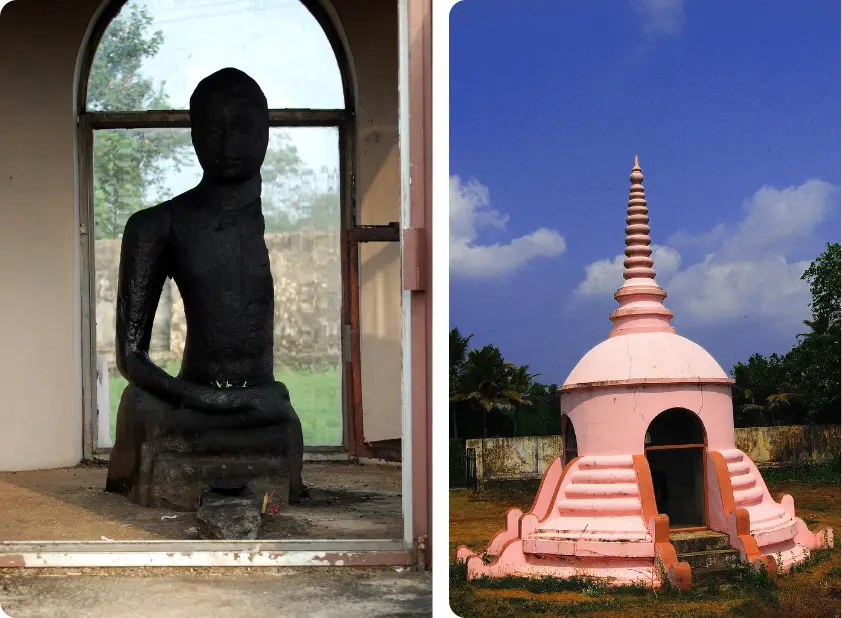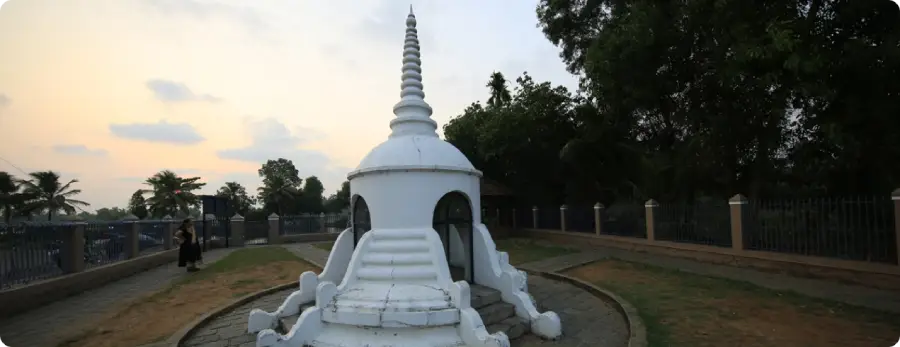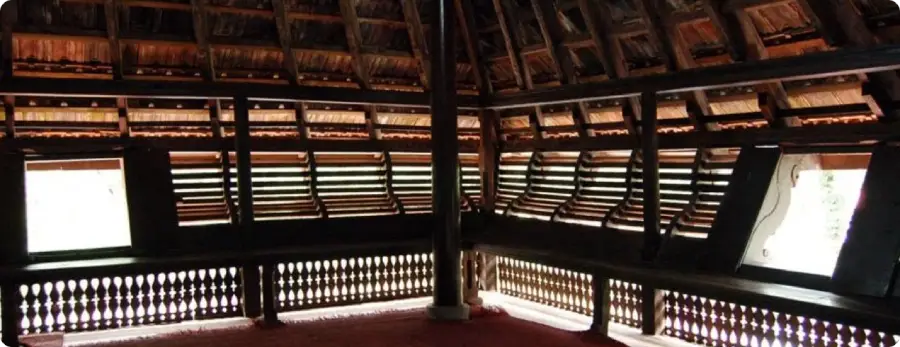Discovering the Karumadikuttan Buddha Statue

Introduction to Karumadikuttan
- Distance from Alappuzha railway station: 17 KM
- Distance from Alappuzha Bus stand: 18 KM
- Distance from Alappuzha Boat Jetty: 18 KM
Nestled in the serene village of Karumadi, a stone’s throw away from the bustling town of Alappuzha, stands a remarkable testament to Kerala’s rich cultural and historical tapestry—the Karumadikuttan Buddha Statue. This ancient black granite statue, a silent sentinel of history, captures the essence of Kerala’s diverse heritage and its tryst with Buddhism. The Karumadikuttan, often hailed as a beacon of peace and spirituality, is not just a relic; it’s a bridge connecting the present to the mystical past of the 9th to 14th centuries.

Karumadikuttan: At the Heart of Kerala’s Spiritual Landscape
Karumadi, with its lush greenery and tranquil backwaters, offers more than just picturesque landscapes. It is home to the Karumadikuttan Buddha Statue, a key pilgrimage and tourist site that draws visitors from across the globe. The statue’s significance transcends mere artistic beauty, embodying the historical and spiritual ethos of Kerala. As one ventures into this quaint village, the statue emerges as a symbol of the enduring legacy of Buddhism in the region, inviting travelers to delve into a journey of exploration and enlightenment.
Unveiling the Mystique of Karumadikuttan
The Dawn of Karumadikuttan
The Karumadikuttan Buddha Statue, ensconced in the verdant embrace of Karumadi near Alappuzha, Kerala, is a venerable emblem of tranquility and spiritual solace. Carved from black granite, this majestic statue dates back to a period between the 9th and 14th centuries, a time when Buddhism flourished in the southern realms of India. The origins of Karumadikuttan are shrouded in the mists of time, yet it stands as a silent witness to the ebb and flow of cultures and religions that have swept across Kerala.
Rediscovery by Sir Robert Bristow
In the 1930s, the tranquility of Karumadi was pierced by the keen eyes of Sir Robert Bristow, a British engineer whose contributions to Kerala’s ports are well-documented. Stumbling upon the statue, partially submerged in the Karumady thodu (canal), Bristow recognized its historical significance and spearheaded efforts to preserve this priceless artifact. His intervention marked the beginning of a new chapter in the life of Karumadikuttan, transforming it from a forgotten relic to a cherished monument under the protection of the Kerala state government.
A Beacon of Buddhist Heritage in Kerala
The cultural significance of the Karumadikuttan Buddha Statue transcends its physical form, embodying the rich tapestry of Buddhism’s legacy in Kerala. In a land predominantly known for its Hindu temples and Christian churches, Karumadikuttan serves as a poignant reminder of the Buddhist heritage that once flourished here. Its presence in Kerala is a testament to the religious harmony and diversity that have been the hallmark of this coastal state. Through centuries of change, Karumadikuttan remains a beacon of peace, inviting onlookers to reflect on the serene teachings of the Buddha amidst the lush landscapes of Kerala.
Karumadikuttan: A Masterpiece of Granite and Grace
Eternal Elegance in Black Granite
At the heart of Karumadi’s serene landscape stands the Karumadikuttan Buddha Statue, a magnificent creation carved from the depths of black granite. This exquisite statue, dating back to the rich cultural tapestry of the 9th to 14th centuries, showcases the remarkable craftsmanship of ancient artisans. Its composition in black granite not only adds to its majestic appearance but also contributes to its enduring legacy, withstanding the test of time and elements.

A Testament to Timeless Artistry
The Karumadikuttan Statue is a marvel of partial preservation, with its left side intriguingly missing, yet its beauty remains undiminished. This unique aspect of the statue invites onlookers to ponder the mysteries of its past. The craftsmanship evident in the statue’s intricate details— from the serene expression on Buddha’s face to the delicate folds of his robe—reflects the artistic styles of the period, characterized by a profound understanding of form, symmetry, and spirituality. The artisans of yore have imbued this statue with a life force that transcends the mere stone from which it is carved, making Karumadikuttan not just a piece of art, but a living piece of history that continues to inspire awe and reverence.
The Spiritual Beacon of Karumadikuttan
Karumadikuttan: A Symbol of Serenity and Spirituality
Nestled in the tranquil village of Karumadi, the Karumadikuttan Buddha Statue stands as a profound symbol of peace and enlightenment within Kerala’s diverse religious tapestry. This ancient Buddhist artifact, carved from black granite, plays a pivotal role in the local religious practices, embodying the spiritual heritage and philosophical teachings of Buddhism. Its presence in Kerala is a testament to the state’s rich cultural heritage, particularly in Alappuzha, where it contributes significantly to the cultural identity and spiritual landscape.
The Dalai Lama’s Enduring Influence
The visit of the Dalai Lama in 1965 to the Karumadikuttan Buddha Statue marked a pivotal moment in its history, casting a global spotlight on this serene monument. His Holiness’s presence underscored the statue’s profound spiritual significance and bolstered its recognition as a cornerstone of Buddhist heritage in Kerala. This momentous occasion not only celebrated the cultural and religious significance of Karumadikuttan but also emphasized the universal values of peace and mindfulness that Buddhism espouses.
Custodians of Cultural Heritage
In the wake of the Dalai Lama’s visit, there has been a renewed emphasis on the preservation of historical monuments in Kerala, with Karumadikuttan at the forefront of these efforts. Recognizing its role as a guardian of the region’s ancient Buddhist artifacts, the local community, alongside authorities, has been instrumental in ensuring the statue’s integrity and legacy endure. These preservation efforts highlight the collective commitment to safeguarding Kerala’s rich cultural heritage, ensuring that the teachings and tranquility that Karumadikuttan represents remain accessible to all.
A Legacy of Enlightenment
Today, the Karumadikuttan Buddha Statue continues to be a beacon for those seeking solace and spiritual guidance. Its enduring legacy is a testament to the timeless teachings of Buddhism, resonating with the principles of compassion, peace, and non-violence. As a cherished cultural heritage of Alappuzha, Karumadikuttan not only attracts visitors from across the globe but also serves as a poignant reminder of the importance of preserving our shared history for future generations. Through the collective efforts of the community and the broader Buddhist diaspora, the statue remains a symbol of hope and enlightenment, echoing the ancient wisdom that has traversed centuries to reach us today.
Navigating Your Visit to Karumadikuttan
Best Times to Visit
- Peak Season: November to February, when the weather is cool and pleasant, making it ideal for exploring.
- Monsoon Magic: June to September offers a lush, rain-washed landscape, perfect for those who enjoy the monsoon's charm.
Facilities for Visitors
- Guided Tours: Available at the site, offering insights into the statue's history and significance.
- Accommodation: A range of options from luxury resorts to budget homestays in Alappuzha caters to all preferences.
- Food: Nearby eateries and restaurants serve delicious local cuisine, offering a taste of Kerala's culinary delights.
Exploring Alappuzha: Beyond Karumadikuttan
- Alappuzha Beach: A serene spot for relaxation and sunset views.
- Backwater Cruises: Experience the tranquil backwaters on a houseboat.
- Ambalapuzha Sri Krishna Temple: Renowned for its architectural beauty and Palpayasam, a sweet milk porridge.
- Marari Beach: A pristine beach offering a quiet escape from the crowd.
Conclusion
A Testament to Time
The Karumadikuttan Buddha Statue stands not merely as a stone figure but as a profound emblem of Kerala's rich tapestry of history, culture, and spirituality. Nestled in the serene village of Karumadi, near the vibrant city of Alappuzha, this ancient Buddhist artifact serves as a silent witness to the profound impact of Buddhism in South India. Its preservation is a testament to the enduring efforts to safeguard Kerala's cultural heritage, ensuring that future generations can explore and appreciate the historical monuments of Kerala.
The Spirit of Karumadikuttan
Karumadikuttan is more than an archaeological marvel; it is a spiritual guidepost that continues to inspire and enlighten. Its significance extends beyond its physical form, embodying the essence of peace, compassion, and wisdom that Buddha himself taught. The statue's presence in Kerala enriches the state's cultural heritage, offering a unique glimpse into the spiritual significance of Buddha statues and their role in shaping the philosophical landscape of the region.
An Invitation to Discover
We invite you to delve deeper into the heart of Kerala's Buddhist heritage, to explore the ancient Buddhist artifacts that dot the landscape, and to immerse yourself in the spiritual journey that Karumadikuttan offers. Whether you are a history buff, a spiritual seeker, or a curious traveler, the story of Karumadikuttan and the cultural heritage of Alappuzha await your exploration. Let the serene gaze of the Karumadikuttan Buddha Statue inspire you to uncover the layers of history, spirituality, and culture that make Kerala a treasure trove of experiences.